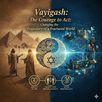Vayishlach: A Timeless Response To The Oldest Hatred
- Rabbi Yosef Vogel

- Dec 13, 2019
- 2 min read

How do you deal with people who hate you? Do you engage them or do you walk away? Should one look to compromise or should one seek a just settlement? If love is the most powerful force in the universe, then hate must be the most destructive. Love is the creator of life, hate destroys it. Human beings are at their most optimal state when they are infused with love. So how does someone who is filled with love deal with someone who is filled with hate? Is it a level playing field? One of the most suspenseful scenes in the biblical narrative is the moment when Jacob is forced to meet his brother Esau. Jacob is fully cognizant of his brothers animosity towards him. Filled with trepidation, he prepares for this showdown with a steely focus. The result is stunning. Not only are tensions diffused, there is also a complete turnaround in attitude. As the verse tells us “Esau ran toward him, embraced him... and kissed him”. What happened? How did Jacob achieve this turnaround? The Rebbe offers a most profound insight. In dealing with our enemies we must combine two diametrically opposing forces. On the one hand, if we want to achieve total reconciliation with our opponents, we must employ a loving approach. However at the same time, we must remember that genuine peace can only be obtained if it is predicated on a true reality and therefore we must stay vigorously loyal to the ideals we hold true. The mystics see this showdown as the prototype for Antisemitism, the oldest hatred in history. First and foremost Jacob maintains his cool and is not intimidated by his brother Esau. He is fearless because he knows that ultimately it is only G-d who is the decisive factor in the turn of events. In addition, weakness can not achieve peace, rather they will only encourage its opposite. Jacob also understands that notwithstanding his deep desire to reconcile with his brother, this must not undermine the responsibility he has to fulfill his mission and purpose in this world. Yes it might be hard for Esau to accept his true role and purpose in life, however no reconciliation can be gained without this. And finally, it is Jacob’s responsibility to guide his brother Esau to play to his strengths by helping him discover his true purpose in life. Only then can real reconciliation and genuine peace be achieved.






Comments